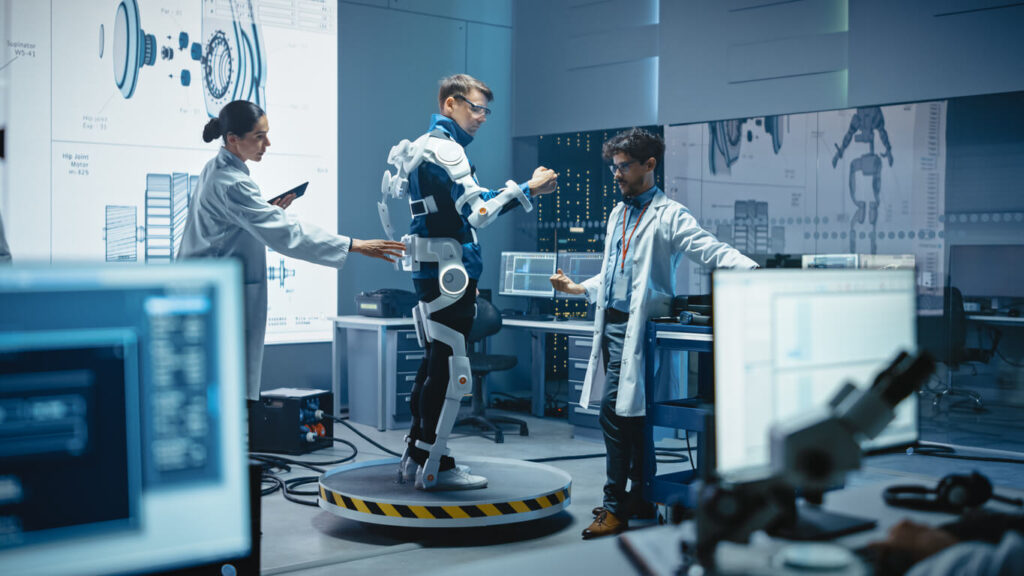Deep tech, a fusion of cutting-edge science and engineering, goes beyond conventional advancement and revolutionises manufacturing processes with previously unimaginable advances.
Artificial intelligence, robotics, advanced materials, and biotechnology are just a few of the innovations that deep tech brings to the production table. These technologies are completely redesigning processes rather than just improving the ones that already exist. From enhanced productivity and a smaller environmental footprint to the development of whole new materials and products, the impact is significant, and it is reshaping manufacturing processes. Discover the world of deep tech, where factories learn and adapt to materials that are stronger, lighter, and more sustainable.
What Does Deep Tech Mean?
Deep technology, often known as deep tech or hard tech, refers to advanced technologies that are grounded in significant scientific or engineering challenges. Innovations in artificial intelligence, biotechnology, robotics, quantum computing, and advanced materials all fall under this category. Deep tech usually focuses on a novel understanding or application of scientific and technical principles, in contrast to conventional technology, which sometimes comprises small advances or uses of already-known knowledge. Deep tech is now at the forefront of ground-breaking innovations and breakthrough solutions.
Deep Tech in Manufacturing

Deep tech has enormous significance when it comes to production. Conventional manufacturing technologies typically concentrate on increasing productivity, streamlining current procedures, or expanding output. Whereas deep tech introduces completely new capabilities and redefines what is feasible in production, bringing about revolutionary developments.
The innovations of deep tech in comparison to traditional manufacturing technology are as follows:
- Advanced Materials and Nanotechnology – deep tech makes it possible to create materials with characteristics that are specific to a given use, frequently at the molecular or atomic level, which is not possible with traditional production technologies.
- Robotics and Automation – while deep tech combines modern robots with AI to perform more complex, adaptable, and intelligent operations, traditional manufacturing uses robotics largely for repetitive tasks.
- AI and Machine Learning – deep tech integrates AI and machine learning to go beyond simple automation, allowing for smart decision-making, process optimisation, and predictive analytics in the manufacturing sector.
- 3D Printing and Additive Manufacturing – deep tech embraces additive manufacturing, building products layer by layer and enabling more intricate designs and customisation, whereas traditional manufacturing depends on subtractive techniques, which involve removing material to make a product.
- Internet of Things (IoT) – deep tech surpasses conventional techniques of data collecting and analysis by integrating IoT for real-time monitoring and manufacturing process optimisation.
3 Main Benefits of Deep Tech in Manufacturing
Deep tech in manufacturing addresses specific difficulties such as:
- Complex Problem-Solving: Deep tech produces materials with specific properties or automates very complex tasks that are beyond the capabilities of conventional technologies to address production difficulties.
- Innovation at the Boundaries of Science: Deep tech businesses usually push the boundaries of what is currently practical in terms of manufacturing, working at the cutting edge of science and engineering.
- Multidisciplinary Integration: The convergence of several scientific and technical domains is sometimes required for deep tech manufacturing solutions, which raises integration and implementation challenges.
Sustainability and Green Manufacturing
Deep tech may help create a more environmentally friendly manufacturing industry by decreasing waste, improving energy efficiency, and facilitating circular economic activities. It is making a big difference in environmentally friendly manufacturing by improving accuracy and efficiency in industrial processes. Compared to typical subtractive procedures, this innovation reduces waste, especially in additive manufacturing, such as 3D printing, where materials are added only when needed.

Another important advantage is energy efficiency. Real-time energy monitoring and optimisation are made possible by smart sensors and IoT devices, which lowers energy usage and carbon emissions.
Furthermore, deep tech advances recycling procedures and creates sustainable materials to promote the circular economy. Blockchain technology provides transparency into the material life cycles, encouraging ethical sourcing and recycling—two essential practices for reducing environmental impact.
Case Studies
According to The 2023 European Deep Tech Report, nearly all modern technology has its origins in ‘deep tech’ and it is present in the core of the most valuable businesses and sectors, including those that produce cars, power, phones, and aeroplanes. Some of the examples highlighted in the report were Google, Apple, Mercedes-Benz and BionTech.

Swiss Deep Tech
Switzerland has a long history of innovation and is well-positioned thanks to its reputation for pioneering research, high-quality manufacturing, and precise engineering. Swiss deep tech is a prime illustration of how a nation may use its advantages in science and engineering to influence manufacturing across the globe.
Switzerland is a major investor in emerging technologies, particularly in robotics, AI, smart tech and nanotechnology. Through these investments, traditional manufacturing processes are being transformed to become more sustainable, effective, and able to produce complex, high-quality products.
Companies like Neural Concept and Resistell AG are representative of Switzerland’s commitment to deep tech. Neural Concept focuses on deep learning algorithms for industrial engineering, while Resistell AG develops antibiotic resistance tests using ‘first in class nanomotion technology platform’.
Switzerland is an important region for Distrelec, an electronic components distributor with Swiss origins. Products from prominent Swiss brands such as ABB, TE Connectivity, and ST are distributed by Distrelec. Click on the button below to visit our webshop.
Challenges and the Future of Deep Tech
Deep tech has the potential to bring about revolutionary advances in a wide range of industries. It plays an especially important role in addressing global challenges like healthcare and climate change.
Although deep tech has a bright future, it also presents some challenges. The requirement for large investment, a skills deficit in cutting-edge technology, and protracted development cycles that might push away investors are some of the main obstacles. Another issue is the complexity of regulations, which is especially true for emerging industries like biotech and AI.
However, despite obstacles like finance and regulations, deep tech still has a great chance of fostering substantial innovation and solving pressing global issues. It will probably be more deeply integrated into sectors in the future, encouraged by supporting regulations and multidisciplinary cooperation.











